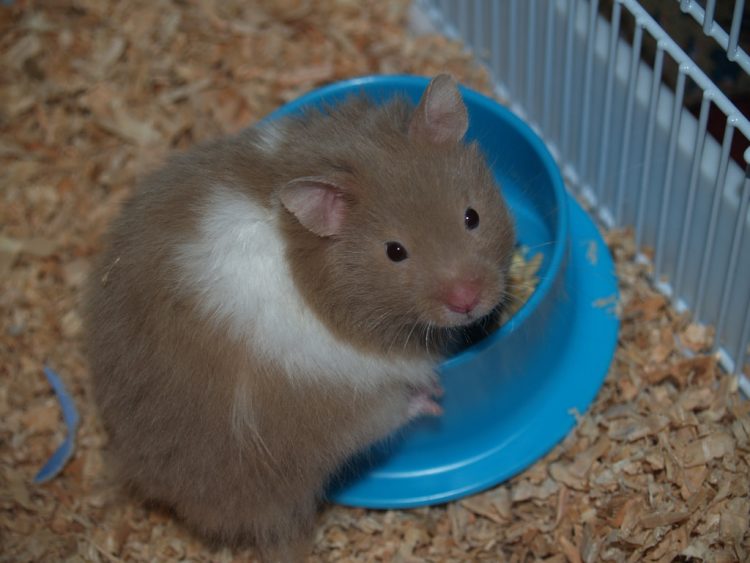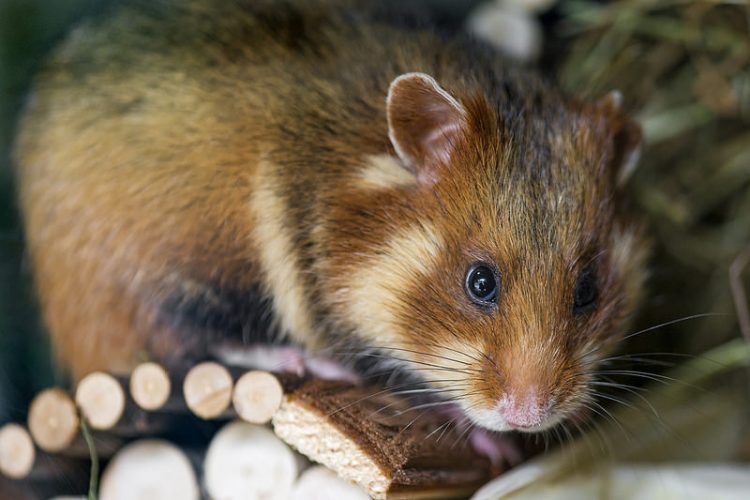
You’ve recently brought home a new hamster. Congratulations! So far, everything has been going splendidly. He’s adjusting to his new surroundings and may even act happy when he sees you approach his cage — a big bonus for any hamster keeper.
But then you notice it — he’s urinating in his food dish. Blech! Naturally, you take all that food and throw it out because it can’t possibly be good for him.
But then he does it again. And again. And yet again. What’s going on, and how can you prevent this odd behavior?
Territoriality
Hamsters were once wild and have retained more than a few of those instinctual behaviors. Urine may seem gross to us humans, but to animals, it’s a completely different story. As most people with hamsters have experienced, several species use it to denote territory.
Hamsters might not lift their legs, but when they urinate on their food, they could be trying to tell other animals, “Hey, back off, this is my food store!” And you could unwittingly be contributing to the problem.
When cleaning your hamster’s cage, you’ll probably come across some of his food stores. Hamsters are great hoarders, often hiding away food for later consumption. But a hamster doesn’t understand that we’re removing his food store because it’s old or moldy — all he knows is it’s gone. So when he stores his food again, he may urinate on it to tell the world not to touch it.
If you must remove the food, simply replace it with fresh food immediately. Then he has food in his caches but isn’t at risk of getting sick from moldy food.

Illness
Hamsters tend to be very clean animals, even without bathing — bathing can actually make them sick — so if you notice that your hamster is soaked in his own urine or constantly urinating into his food, there may be a medical issue.
According to Merck Manuals, here are some diseases that hamsters can acquire in their lifetimes:
- Proliferative enteritis
- Tyzzer’s disease
- Salmonellosis (note that hamsters can pass the salmonella bacteria to humans)
- Tapeworm
- Pinworm
- Ringworm
- Pneumonia
- Kidney infections
Also monitor your hamster for “wet tail” or proliferative ileitis. This disease usually manifests as severe diarrhea — it looks like liquid and (eek!) may end up in a food dish.“The ability of the bacteria that causes the condition [wet tail] to gain a foothold in the hamster is directly linked to conditions within the animal’s environment that make her system susceptible to bacterial infection,” warns Betsy Sikora Siino in Hamster: Your Happy Healthy Pet.
Know that wet tail is highly contagious and sometimes fatal to hamsters. Monitor new hamsters closely in the days and weeks that they join your household. Those with wet tail commonly contract it at pet stores or shelters, and other hamsters already in your home will be highly susceptible.
If you suspect your hamster has wet tail or any other illness, contact the vet immediately — she can run tests to determine what might be the trouble.
Watch how this plucky little hamster stores his food:

Stress
Hamsters are easily stressed by several factors that you can have control over, including cage cleaning, food store removal, exposure to other animals (including but not limited to other hamsters) and loud noises.
Siino says, “Keep stress under control by sticking to a regular routine in your hamster’s daily and weekly care and by keeping her habitat clean and well-maintained. In addition, restrict her interactions only to those individuals who respect the hamster and understand how to handle her correctly.” So, basically, take care of your hamster to the best of your abilities.
By keeping your hamster’s habitat clean, replacing food stores and limiting his exposure to unfamiliar people, sounds and animals, you help reduce his stress. Not only may this help with his urination issues, but also it will make for an overall happier hamster.
Understanding hamster behavior can help you better care for your furry family member — and stop that pesky peeing in the food dish.


